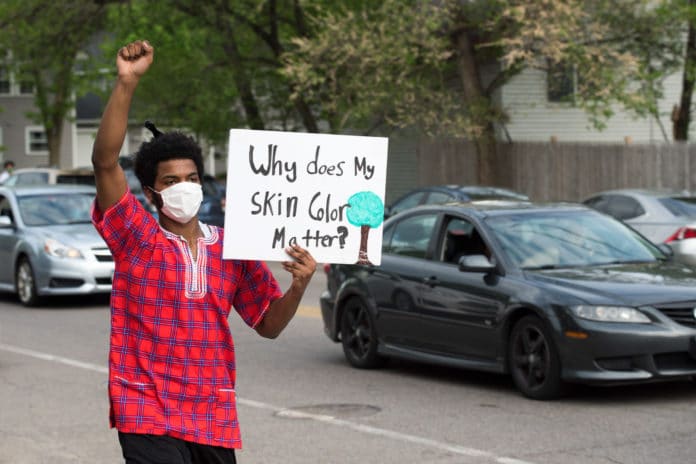
The use of the “r” word needs to stop. The “r” word, or “racist,” has become the go-to accusation for any disagreeable interaction between blacks and whites.
Racism or racist used to describe someone who discriminates against another because of the color of their skin. Today, it’s synonymous with rude or inadequate or inconsiderate or incompetent or any behavior we don’t understand or like.
Actions that used to be labeled responsible are now labeled racist.
Case in point: After Somali youth piloted a night of chaos and mayhem in downtown Minneapolis July 4, city and community leaders denounced City Council Member Michael Rainville as the “r” word for saying he planned to tell Somali leaders to get their children under control.
Since when is telling a parent their children are behaving badly racist? It used to be responsible.
Poor Rainville. As so many do, he sacrificed himself at the altar of the woke gods and sniveled an apology for doing what responsible adults should do.
We’ve abandoned reason and critical thinking and go straight for the nuclear option.
Calling someone the “r” word ought to be considered “hate speech.” It’s dehumanizing, intimidating, and indefensible. It’s used to silence people who don’t agree with a particular point of view.
According to the American Library Association’s definition, calling someone the “r” word fits the standard for hate speech. The ALA says while there’s no legal definition of “hate speech,” hate speech vilifies, humiliates, or incites hatred against someone because of their race, religion, skin color, sexual identity, gender identity, ethnicity, disability, or national origin.
How often is the “r” word lobbed at a white person for no other reason than they’re white?
Because Critical Race Theory (or Equity or Social Emotional Learning or Culturally Responsive Teaching or whatever euphemism you prefer) teaches racism is present in every interaction in society and progressives happily perpetuate the narrative, we’re conditioned to see racism where it may not exist. If you’re black and you’re unhappy with the outcome, you must be a victim of racism.
Actions that used to be labeled rude are now labeled racist.
What if you’re dealing with someone who’s not racist but is just rude? We tend to go for the most extreme explanation and discount anything in between.
I’ll use my experience in the grocery story store as an example. After a white cashier finished ringing up a white man, she looked at me (a black woman), closed her cash drawer, and walked off without so much as a nod to me.
Giving her the benefit of the doubt, I waited to see if she planned to come right back. She didn’t. I was irritated but asked another employee, who happened to walk by, to ring my order. He sought out the cashier, who was just out of my line of sight, and I heard him tell her she had a customer waiting at her register, to which she dismissively replied, “Yeah, I know.” But she still did not return to the register.
Then I got mad.
I spoke to the store manager, told him what happened, and said if he wanted to keep my business, he needed to teach his employees how to treat customers.
He apologized. And that was the end of it. But in many cases today, it wouldn’t have been.
Because she is white and I am black, in today’s culture, many would dub the cashier as a “Karen” or racist.
The optics certainly were not favorable for her.
But how could I unequivocally determine her actions were racially motivated?
I couldn’t.
The word racist never crossed my mind. Not because I believe racists don’t exist. But because I don’t believe white people who are rude to me are rude to me simply because I’m black. Some probably are, but the majority are not.
Truth is, you can’t always determine whether someone’s actions are racially motivated, which is why the “r” word is so harmful. It calls someone’s character into question and can ruin a reputation, often times with little to no proof.
If a better qualified white person is promoted over a black person, is it racist?
If a white employee brings fried chicken to an office potluck, is it racist? If a police officer pulls me over, should I automatically assume it’s because I’m black even if I am speeding?
If you ask someone to control their unruly child, is it racist?
Did that cashier commit an unconscious “microaggression” and behave with racial bias without knowing? Perhaps. But, if she had been black and behaved the same way, what would I call her? Are white people only rude to other white people but the “r” word when they’re rude to black people?
Was the cashier rude because I’m black? I have no way of knowing. But to go straight to DEFCON 1 and call her a racist isn’t helpful to anyone. Once I start believing all white people are rude to me just because of the color of my skin, I become suspicious and start attributing behaviors I don’t like to racism.
Racism and racist people do exist in America. They always will. But not every white person who insults or disagrees with a black person is a racist. And not every black person who experiences unfavorable outcomes is a victim of racism.
Let’s get back to treating each other as fellow Americans who are sometimes rude and inconsiderate or disagreeable. If someone’s rude, call them rude. If someone tells an off-color joke, roll your eyes, say they have poor judgment, and ask them not to say it again. Let’s tailor our responses to fit the offense.
Hopefully, that cashier will get coaching and an opportunity to make some changes. And hopefully, we’ll look for reasons besides racism to explain behavior.
Sheila Qualls
Sheila Qualls is an award-winning journalist and former civilian editor of an Army newspaper. Prior to joining Alpha News, she was a Christian Marriage and Family columnist at Patheos.com and a personal coach. Her work has been published in The Upper Room, the MOPS blog, Grown and Flown, and The Christian Post. She speaks nationally on issues involving faith and family.
















